Examining Contemporary Issues in the Global Hotel and Tourism
VerifiedAdded on 2023/05/30
|8
|1527
|448
Report
AI Summary
This report examines contemporary issues in the tourism sector, focusing on increased environmental awareness, technological advancements, and lack of security. The increasing number of tourists strains natural resources, leading to pollution and habitat loss, exemplified by the coral bleaching issue in Australia's Great Barrier Reef. While technology enhances accessibility and personalization, it can also lead to job displacement and a decline in the human touch, with some travelers seeking destinations free from technological interference. Security concerns, heightened by terrorism and political unrest, significantly impact travel decisions, as seen in the decline of tourism in regions affected by terrorism. The report concludes that addressing these issues is crucial for the sustainable development of the tourism industry, which faces uncertain market conditions and currency fluctuations. Desklib offers more resources for students.
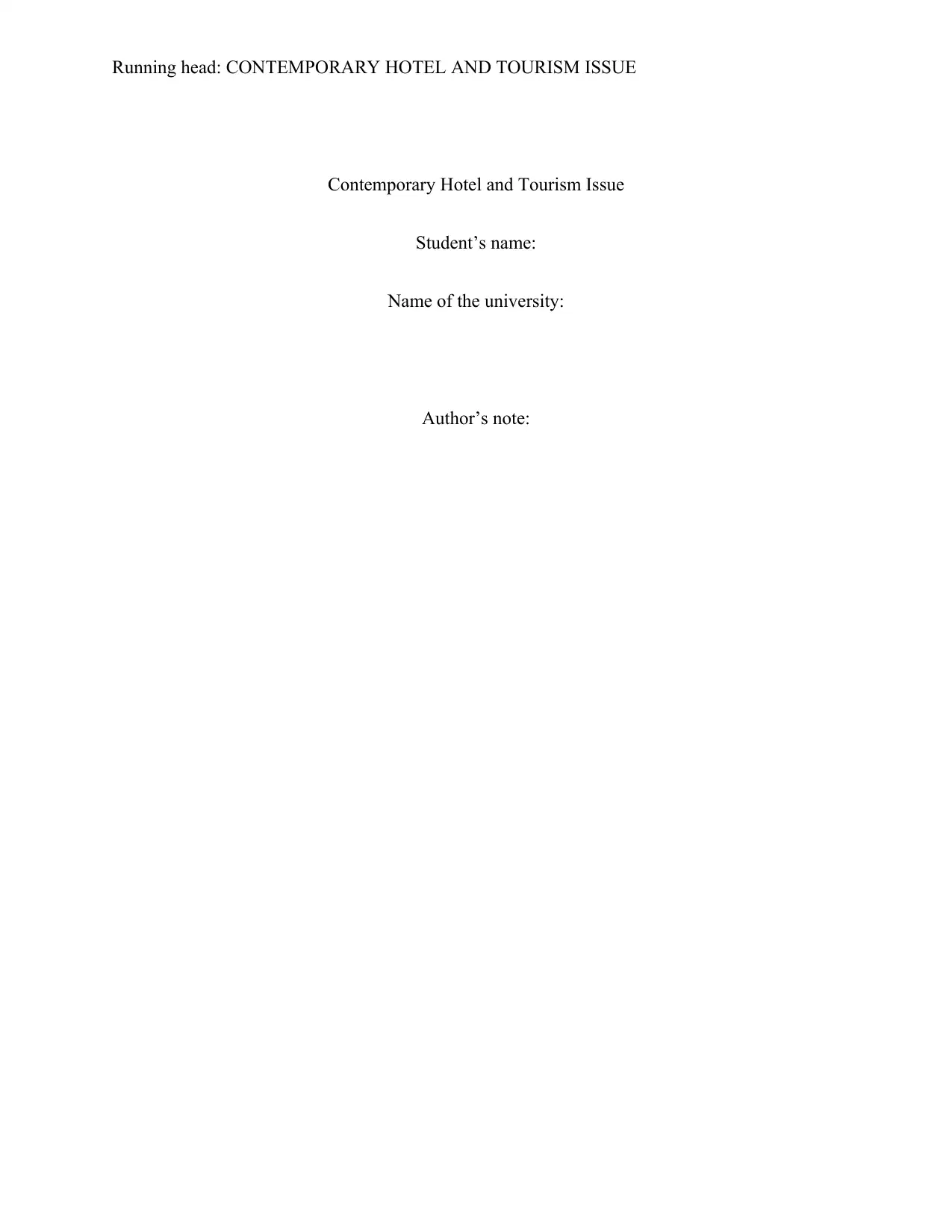
Running head: CONTEMPORARY HOTEL AND TOURISM ISSUE
Contemporary Hotel and Tourism Issue
Student’s name:
Name of the university:
Author’s note:
Contemporary Hotel and Tourism Issue
Student’s name:
Name of the university:
Author’s note:
Paraphrase This Document
Need a fresh take? Get an instant paraphrase of this document with our AI Paraphraser
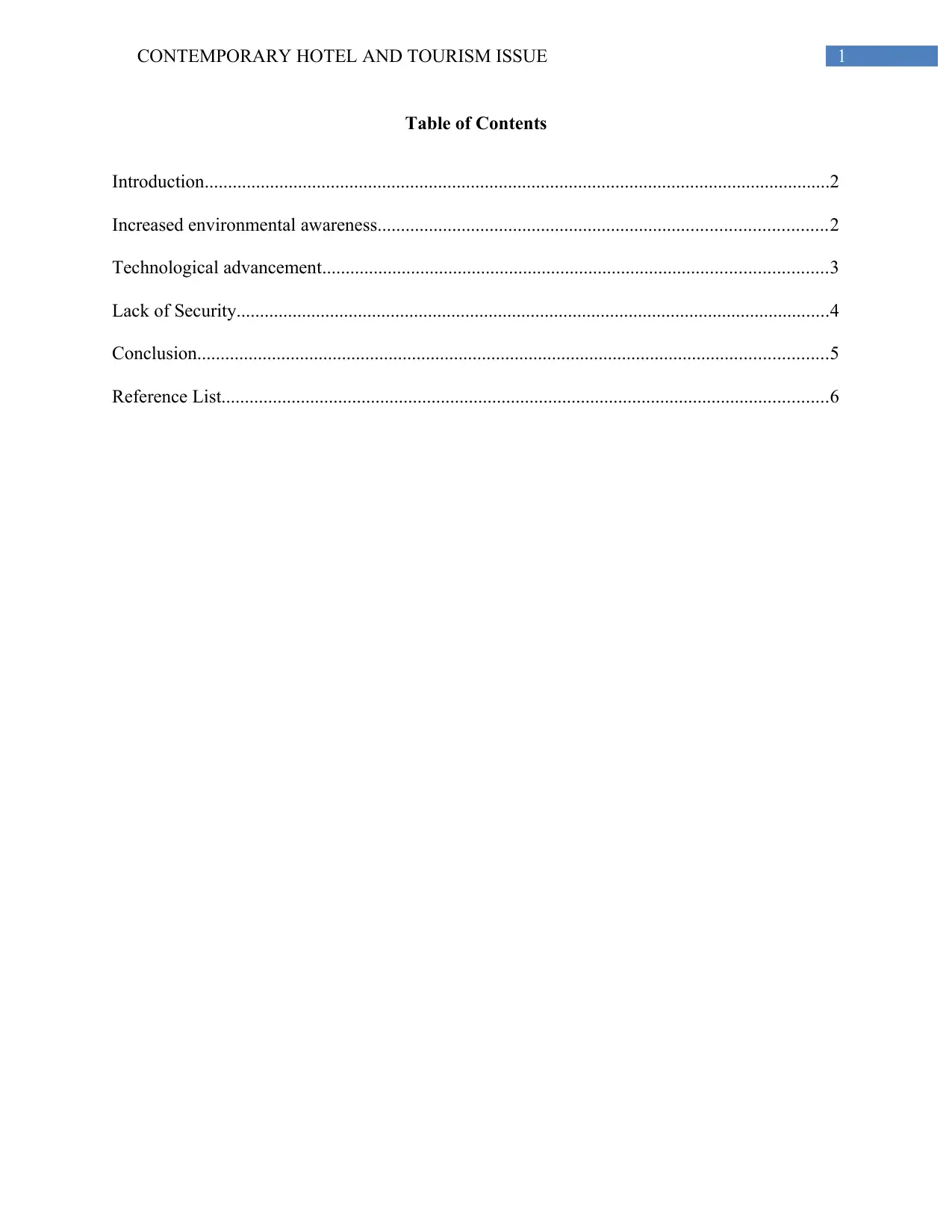
1CONTEMPORARY HOTEL AND TOURISM ISSUE
Table of Contents
Introduction......................................................................................................................................2
Increased environmental awareness................................................................................................2
Technological advancement............................................................................................................3
Lack of Security...............................................................................................................................4
Conclusion.......................................................................................................................................5
Reference List..................................................................................................................................6
Table of Contents
Introduction......................................................................................................................................2
Increased environmental awareness................................................................................................2
Technological advancement............................................................................................................3
Lack of Security...............................................................................................................................4
Conclusion.......................................................................................................................................5
Reference List..................................................................................................................................6
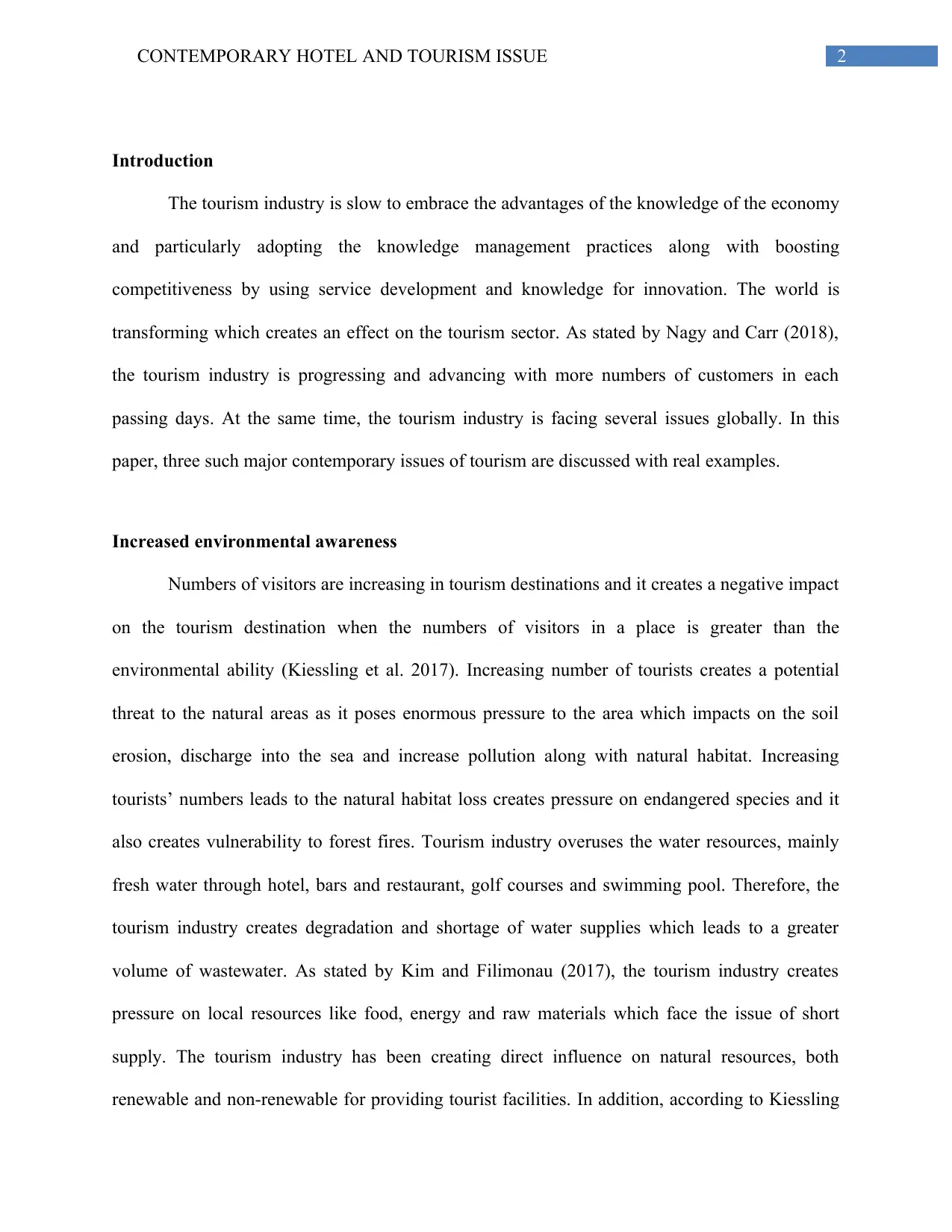
2CONTEMPORARY HOTEL AND TOURISM ISSUE
Introduction
The tourism industry is slow to embrace the advantages of the knowledge of the economy
and particularly adopting the knowledge management practices along with boosting
competitiveness by using service development and knowledge for innovation. The world is
transforming which creates an effect on the tourism sector. As stated by Nagy and Carr (2018),
the tourism industry is progressing and advancing with more numbers of customers in each
passing days. At the same time, the tourism industry is facing several issues globally. In this
paper, three such major contemporary issues of tourism are discussed with real examples.
Increased environmental awareness
Numbers of visitors are increasing in tourism destinations and it creates a negative impact
on the tourism destination when the numbers of visitors in a place is greater than the
environmental ability (Kiessling et al. 2017). Increasing number of tourists creates a potential
threat to the natural areas as it poses enormous pressure to the area which impacts on the soil
erosion, discharge into the sea and increase pollution along with natural habitat. Increasing
tourists’ numbers leads to the natural habitat loss creates pressure on endangered species and it
also creates vulnerability to forest fires. Tourism industry overuses the water resources, mainly
fresh water through hotel, bars and restaurant, golf courses and swimming pool. Therefore, the
tourism industry creates degradation and shortage of water supplies which leads to a greater
volume of wastewater. As stated by Kim and Filimonau (2017), the tourism industry creates
pressure on local resources like food, energy and raw materials which face the issue of short
supply. The tourism industry has been creating direct influence on natural resources, both
renewable and non-renewable for providing tourist facilities. In addition, according to Kiessling
Introduction
The tourism industry is slow to embrace the advantages of the knowledge of the economy
and particularly adopting the knowledge management practices along with boosting
competitiveness by using service development and knowledge for innovation. The world is
transforming which creates an effect on the tourism sector. As stated by Nagy and Carr (2018),
the tourism industry is progressing and advancing with more numbers of customers in each
passing days. At the same time, the tourism industry is facing several issues globally. In this
paper, three such major contemporary issues of tourism are discussed with real examples.
Increased environmental awareness
Numbers of visitors are increasing in tourism destinations and it creates a negative impact
on the tourism destination when the numbers of visitors in a place is greater than the
environmental ability (Kiessling et al. 2017). Increasing number of tourists creates a potential
threat to the natural areas as it poses enormous pressure to the area which impacts on the soil
erosion, discharge into the sea and increase pollution along with natural habitat. Increasing
tourists’ numbers leads to the natural habitat loss creates pressure on endangered species and it
also creates vulnerability to forest fires. Tourism industry overuses the water resources, mainly
fresh water through hotel, bars and restaurant, golf courses and swimming pool. Therefore, the
tourism industry creates degradation and shortage of water supplies which leads to a greater
volume of wastewater. As stated by Kim and Filimonau (2017), the tourism industry creates
pressure on local resources like food, energy and raw materials which face the issue of short
supply. The tourism industry has been creating direct influence on natural resources, both
renewable and non-renewable for providing tourist facilities. In addition, according to Kiessling
⊘ This is a preview!⊘
Do you want full access?
Subscribe today to unlock all pages.

Trusted by 1+ million students worldwide
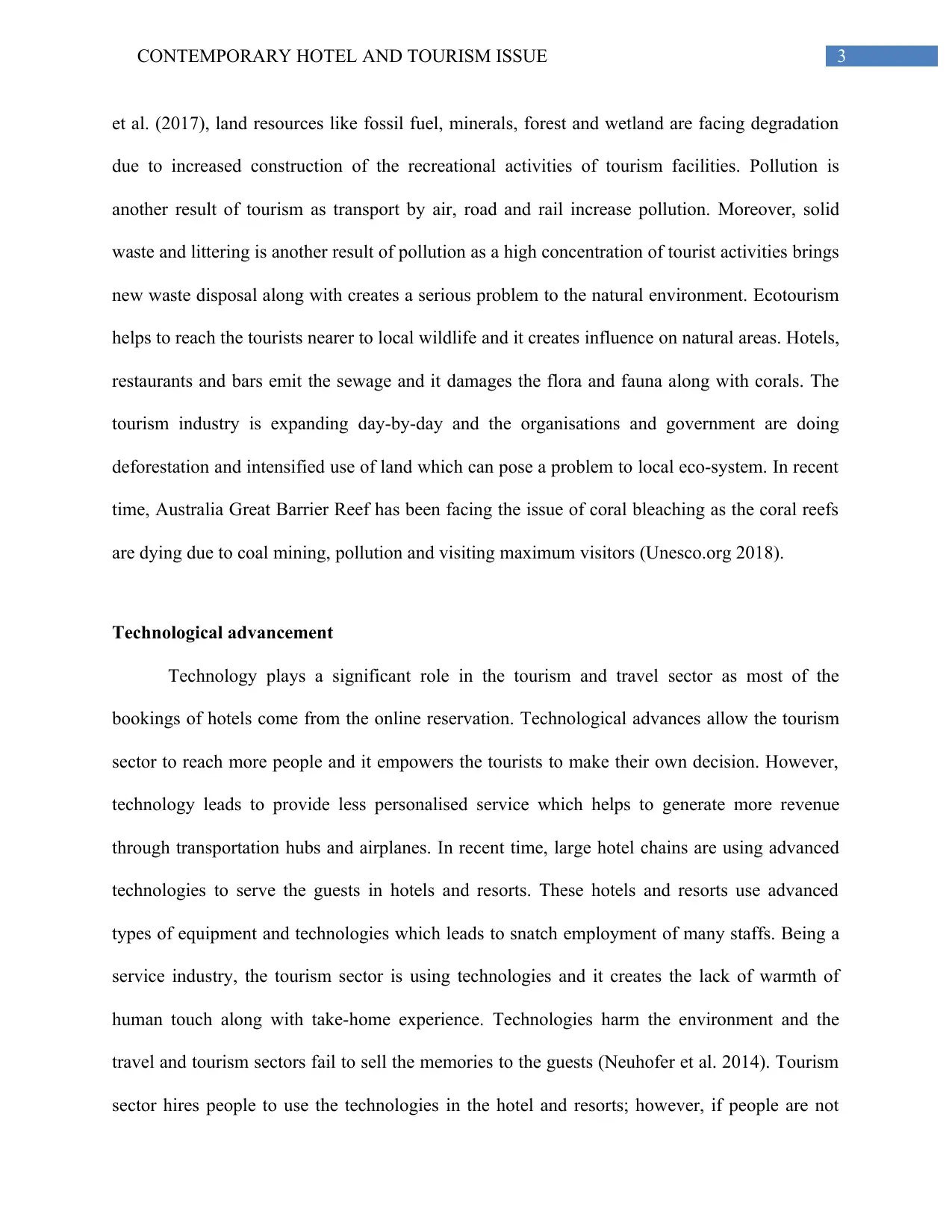
3CONTEMPORARY HOTEL AND TOURISM ISSUE
et al. (2017), land resources like fossil fuel, minerals, forest and wetland are facing degradation
due to increased construction of the recreational activities of tourism facilities. Pollution is
another result of tourism as transport by air, road and rail increase pollution. Moreover, solid
waste and littering is another result of pollution as a high concentration of tourist activities brings
new waste disposal along with creates a serious problem to the natural environment. Ecotourism
helps to reach the tourists nearer to local wildlife and it creates influence on natural areas. Hotels,
restaurants and bars emit the sewage and it damages the flora and fauna along with corals. The
tourism industry is expanding day-by-day and the organisations and government are doing
deforestation and intensified use of land which can pose a problem to local eco-system. In recent
time, Australia Great Barrier Reef has been facing the issue of coral bleaching as the coral reefs
are dying due to coal mining, pollution and visiting maximum visitors (Unesco.org 2018).
Technological advancement
Technology plays a significant role in the tourism and travel sector as most of the
bookings of hotels come from the online reservation. Technological advances allow the tourism
sector to reach more people and it empowers the tourists to make their own decision. However,
technology leads to provide less personalised service which helps to generate more revenue
through transportation hubs and airplanes. In recent time, large hotel chains are using advanced
technologies to serve the guests in hotels and resorts. These hotels and resorts use advanced
types of equipment and technologies which leads to snatch employment of many staffs. Being a
service industry, the tourism sector is using technologies and it creates the lack of warmth of
human touch along with take-home experience. Technologies harm the environment and the
travel and tourism sectors fail to sell the memories to the guests (Neuhofer et al. 2014). Tourism
sector hires people to use the technologies in the hotel and resorts; however, if people are not
et al. (2017), land resources like fossil fuel, minerals, forest and wetland are facing degradation
due to increased construction of the recreational activities of tourism facilities. Pollution is
another result of tourism as transport by air, road and rail increase pollution. Moreover, solid
waste and littering is another result of pollution as a high concentration of tourist activities brings
new waste disposal along with creates a serious problem to the natural environment. Ecotourism
helps to reach the tourists nearer to local wildlife and it creates influence on natural areas. Hotels,
restaurants and bars emit the sewage and it damages the flora and fauna along with corals. The
tourism industry is expanding day-by-day and the organisations and government are doing
deforestation and intensified use of land which can pose a problem to local eco-system. In recent
time, Australia Great Barrier Reef has been facing the issue of coral bleaching as the coral reefs
are dying due to coal mining, pollution and visiting maximum visitors (Unesco.org 2018).
Technological advancement
Technology plays a significant role in the tourism and travel sector as most of the
bookings of hotels come from the online reservation. Technological advances allow the tourism
sector to reach more people and it empowers the tourists to make their own decision. However,
technology leads to provide less personalised service which helps to generate more revenue
through transportation hubs and airplanes. In recent time, large hotel chains are using advanced
technologies to serve the guests in hotels and resorts. These hotels and resorts use advanced
types of equipment and technologies which leads to snatch employment of many staffs. Being a
service industry, the tourism sector is using technologies and it creates the lack of warmth of
human touch along with take-home experience. Technologies harm the environment and the
travel and tourism sectors fail to sell the memories to the guests (Neuhofer et al. 2014). Tourism
sector hires people to use the technologies in the hotel and resorts; however, if people are not
Paraphrase This Document
Need a fresh take? Get an instant paraphrase of this document with our AI Paraphraser
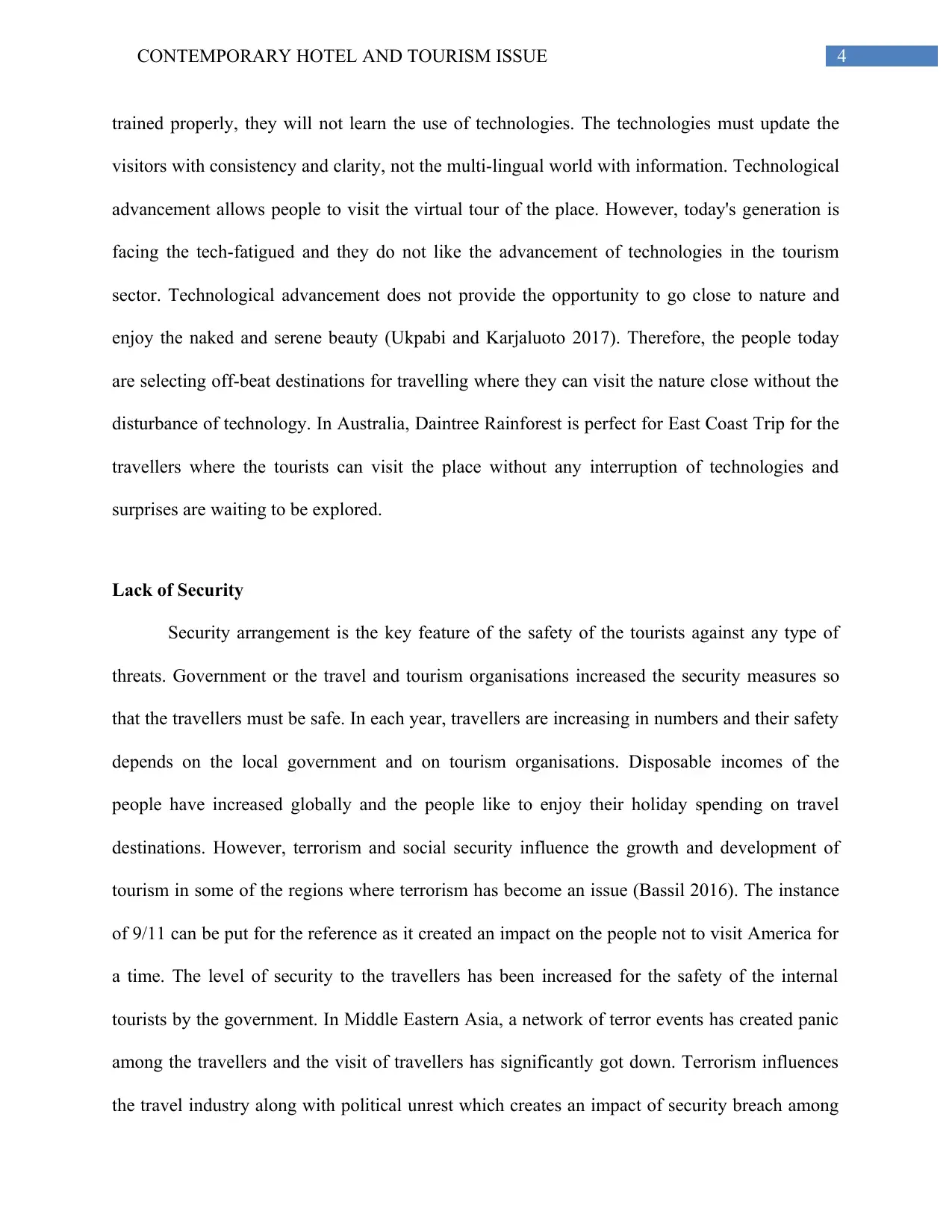
4CONTEMPORARY HOTEL AND TOURISM ISSUE
trained properly, they will not learn the use of technologies. The technologies must update the
visitors with consistency and clarity, not the multi-lingual world with information. Technological
advancement allows people to visit the virtual tour of the place. However, today's generation is
facing the tech-fatigued and they do not like the advancement of technologies in the tourism
sector. Technological advancement does not provide the opportunity to go close to nature and
enjoy the naked and serene beauty (Ukpabi and Karjaluoto 2017). Therefore, the people today
are selecting off-beat destinations for travelling where they can visit the nature close without the
disturbance of technology. In Australia, Daintree Rainforest is perfect for East Coast Trip for the
travellers where the tourists can visit the place without any interruption of technologies and
surprises are waiting to be explored.
Lack of Security
Security arrangement is the key feature of the safety of the tourists against any type of
threats. Government or the travel and tourism organisations increased the security measures so
that the travellers must be safe. In each year, travellers are increasing in numbers and their safety
depends on the local government and on tourism organisations. Disposable incomes of the
people have increased globally and the people like to enjoy their holiday spending on travel
destinations. However, terrorism and social security influence the growth and development of
tourism in some of the regions where terrorism has become an issue (Bassil 2016). The instance
of 9/11 can be put for the reference as it created an impact on the people not to visit America for
a time. The level of security to the travellers has been increased for the safety of the internal
tourists by the government. In Middle Eastern Asia, a network of terror events has created panic
among the travellers and the visit of travellers has significantly got down. Terrorism influences
the travel industry along with political unrest which creates an impact of security breach among
trained properly, they will not learn the use of technologies. The technologies must update the
visitors with consistency and clarity, not the multi-lingual world with information. Technological
advancement allows people to visit the virtual tour of the place. However, today's generation is
facing the tech-fatigued and they do not like the advancement of technologies in the tourism
sector. Technological advancement does not provide the opportunity to go close to nature and
enjoy the naked and serene beauty (Ukpabi and Karjaluoto 2017). Therefore, the people today
are selecting off-beat destinations for travelling where they can visit the nature close without the
disturbance of technology. In Australia, Daintree Rainforest is perfect for East Coast Trip for the
travellers where the tourists can visit the place without any interruption of technologies and
surprises are waiting to be explored.
Lack of Security
Security arrangement is the key feature of the safety of the tourists against any type of
threats. Government or the travel and tourism organisations increased the security measures so
that the travellers must be safe. In each year, travellers are increasing in numbers and their safety
depends on the local government and on tourism organisations. Disposable incomes of the
people have increased globally and the people like to enjoy their holiday spending on travel
destinations. However, terrorism and social security influence the growth and development of
tourism in some of the regions where terrorism has become an issue (Bassil 2016). The instance
of 9/11 can be put for the reference as it created an impact on the people not to visit America for
a time. The level of security to the travellers has been increased for the safety of the internal
tourists by the government. In Middle Eastern Asia, a network of terror events has created panic
among the travellers and the visit of travellers has significantly got down. Terrorism influences
the travel industry along with political unrest which creates an impact of security breach among
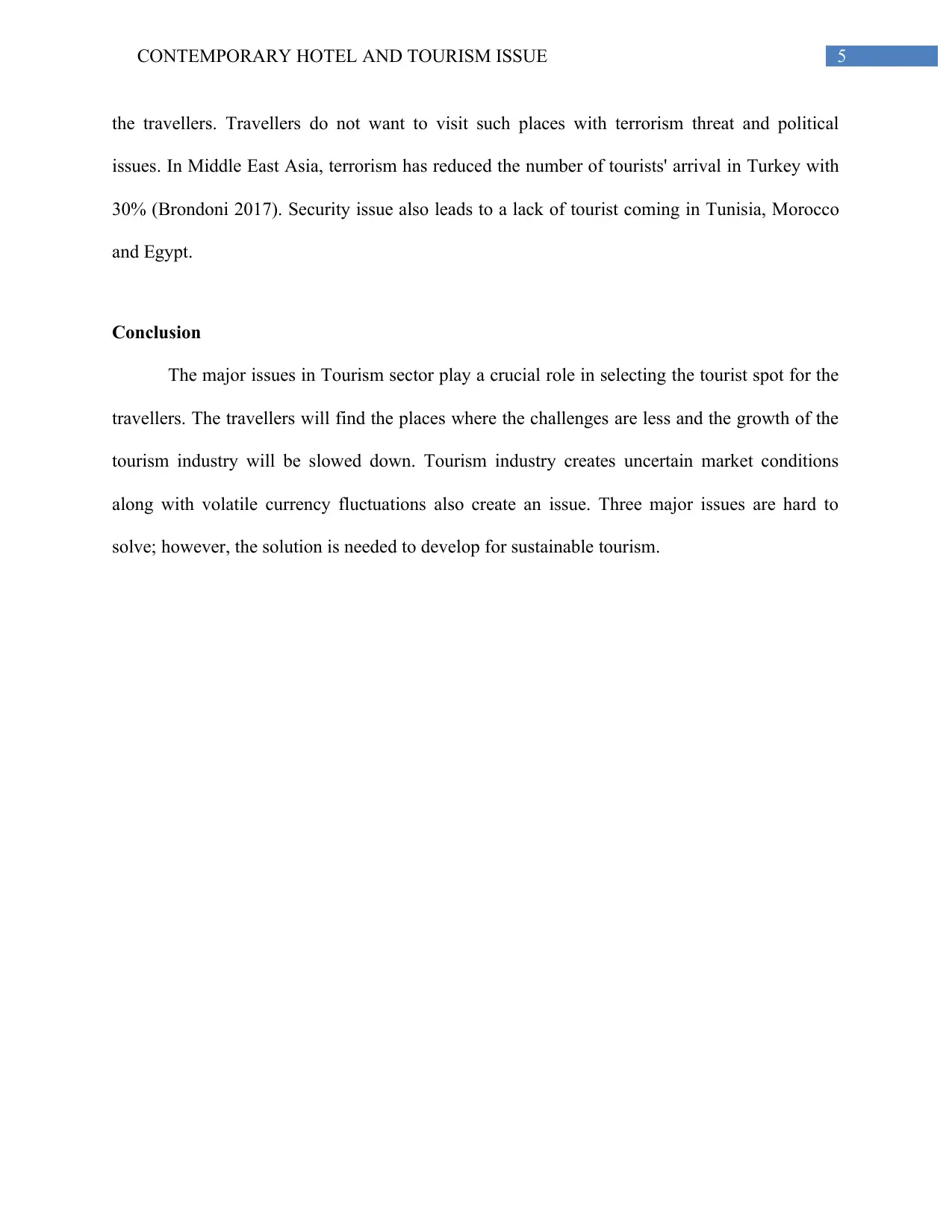
5CONTEMPORARY HOTEL AND TOURISM ISSUE
the travellers. Travellers do not want to visit such places with terrorism threat and political
issues. In Middle East Asia, terrorism has reduced the number of tourists' arrival in Turkey with
30% (Brondoni 2017). Security issue also leads to a lack of tourist coming in Tunisia, Morocco
and Egypt.
Conclusion
The major issues in Tourism sector play a crucial role in selecting the tourist spot for the
travellers. The travellers will find the places where the challenges are less and the growth of the
tourism industry will be slowed down. Tourism industry creates uncertain market conditions
along with volatile currency fluctuations also create an issue. Three major issues are hard to
solve; however, the solution is needed to develop for sustainable tourism.
the travellers. Travellers do not want to visit such places with terrorism threat and political
issues. In Middle East Asia, terrorism has reduced the number of tourists' arrival in Turkey with
30% (Brondoni 2017). Security issue also leads to a lack of tourist coming in Tunisia, Morocco
and Egypt.
Conclusion
The major issues in Tourism sector play a crucial role in selecting the tourist spot for the
travellers. The travellers will find the places where the challenges are less and the growth of the
tourism industry will be slowed down. Tourism industry creates uncertain market conditions
along with volatile currency fluctuations also create an issue. Three major issues are hard to
solve; however, the solution is needed to develop for sustainable tourism.
⊘ This is a preview!⊘
Do you want full access?
Subscribe today to unlock all pages.

Trusted by 1+ million students worldwide
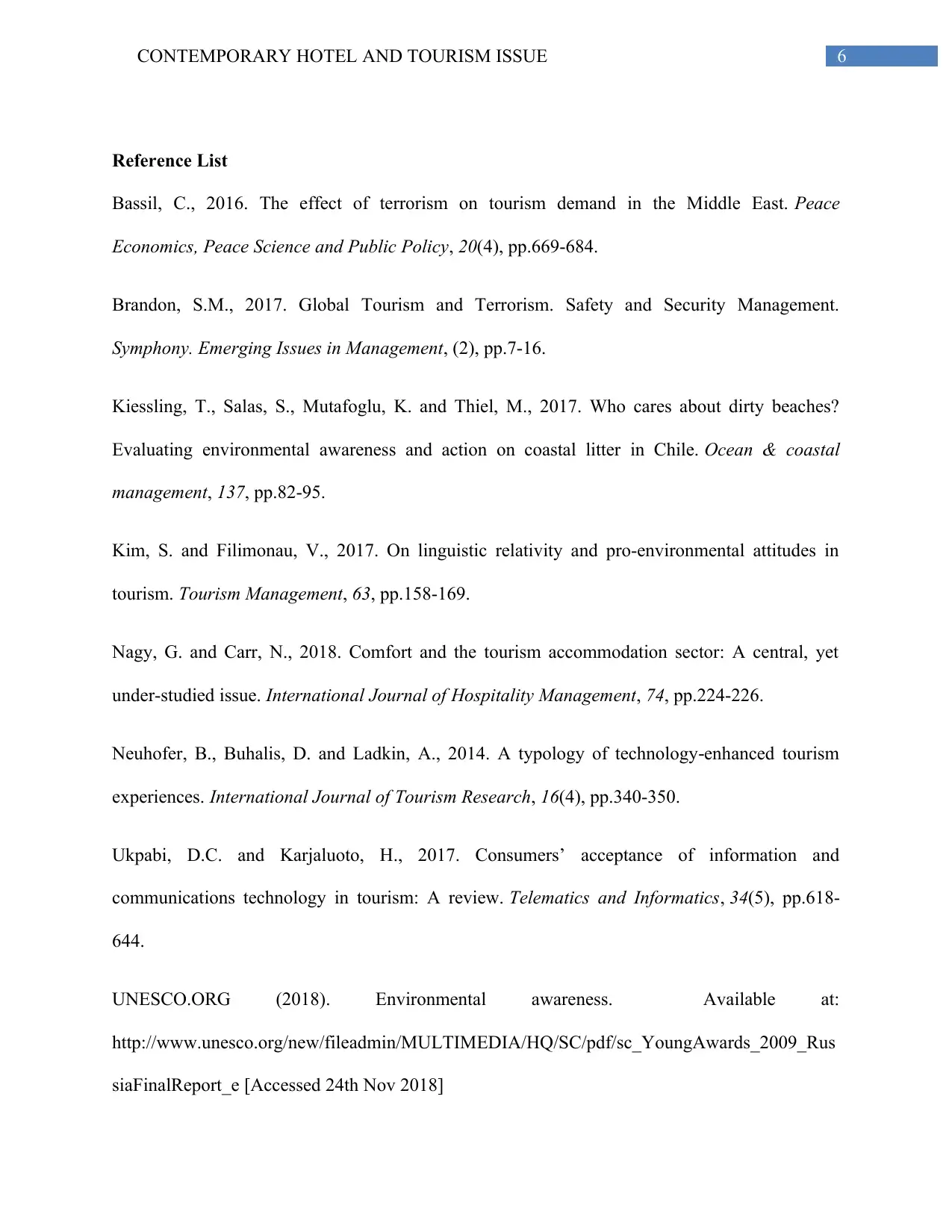
6CONTEMPORARY HOTEL AND TOURISM ISSUE
Reference List
Bassil, C., 2016. The effect of terrorism on tourism demand in the Middle East. Peace
Economics, Peace Science and Public Policy, 20(4), pp.669-684.
Brandon, S.M., 2017. Global Tourism and Terrorism. Safety and Security Management.
Symphony. Emerging Issues in Management, (2), pp.7-16.
Kiessling, T., Salas, S., Mutafoglu, K. and Thiel, M., 2017. Who cares about dirty beaches?
Evaluating environmental awareness and action on coastal litter in Chile. Ocean & coastal
management, 137, pp.82-95.
Kim, S. and Filimonau, V., 2017. On linguistic relativity and pro-environmental attitudes in
tourism. Tourism Management, 63, pp.158-169.
Nagy, G. and Carr, N., 2018. Comfort and the tourism accommodation sector: A central, yet
under-studied issue. International Journal of Hospitality Management, 74, pp.224-226.
Neuhofer, B., Buhalis, D. and Ladkin, A., 2014. A typology of technology enhanced tourism‐
experiences. International Journal of Tourism Research, 16(4), pp.340-350.
Ukpabi, D.C. and Karjaluoto, H., 2017. Consumers’ acceptance of information and
communications technology in tourism: A review. Telematics and Informatics, 34(5), pp.618-
644.
UNESCO.ORG (2018). Environmental awareness. Available at:
http://www.unesco.org/new/fileadmin/MULTIMEDIA/HQ/SC/pdf/sc_YoungAwards_2009_Rus
siaFinalReport_e [Accessed 24th Nov 2018]
Reference List
Bassil, C., 2016. The effect of terrorism on tourism demand in the Middle East. Peace
Economics, Peace Science and Public Policy, 20(4), pp.669-684.
Brandon, S.M., 2017. Global Tourism and Terrorism. Safety and Security Management.
Symphony. Emerging Issues in Management, (2), pp.7-16.
Kiessling, T., Salas, S., Mutafoglu, K. and Thiel, M., 2017. Who cares about dirty beaches?
Evaluating environmental awareness and action on coastal litter in Chile. Ocean & coastal
management, 137, pp.82-95.
Kim, S. and Filimonau, V., 2017. On linguistic relativity and pro-environmental attitudes in
tourism. Tourism Management, 63, pp.158-169.
Nagy, G. and Carr, N., 2018. Comfort and the tourism accommodation sector: A central, yet
under-studied issue. International Journal of Hospitality Management, 74, pp.224-226.
Neuhofer, B., Buhalis, D. and Ladkin, A., 2014. A typology of technology enhanced tourism‐
experiences. International Journal of Tourism Research, 16(4), pp.340-350.
Ukpabi, D.C. and Karjaluoto, H., 2017. Consumers’ acceptance of information and
communications technology in tourism: A review. Telematics and Informatics, 34(5), pp.618-
644.
UNESCO.ORG (2018). Environmental awareness. Available at:
http://www.unesco.org/new/fileadmin/MULTIMEDIA/HQ/SC/pdf/sc_YoungAwards_2009_Rus
siaFinalReport_e [Accessed 24th Nov 2018]
Paraphrase This Document
Need a fresh take? Get an instant paraphrase of this document with our AI Paraphraser

7CONTEMPORARY HOTEL AND TOURISM ISSUE
1 out of 8
Related Documents
Your All-in-One AI-Powered Toolkit for Academic Success.
+13062052269
info@desklib.com
Available 24*7 on WhatsApp / Email
![[object Object]](/_next/static/media/star-bottom.7253800d.svg)
Unlock your academic potential
Copyright © 2020–2026 A2Z Services. All Rights Reserved. Developed and managed by ZUCOL.





